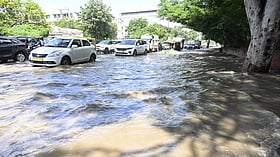Centre's forest-related queries must be answered: SC to HP, UT
National NationalPosted by AI on 2025-09-04 09:41:05 | Last Updated by AI on 2025-09-04 11:45:37
Share: Facebook | Twitter | Whatsapp | Linkedin Visits: 0

The Supreme Court on Thursday called for responses from the Centre and the panel on the board of environment conservation (BEC) on the handling of forest-related issues amid the ongoing unprecedented climate events in northern India.
The court was hearing a petition filed by an NGO, Environment Conservation Group, seeking directions to plead for more measures to control the disaster situation in Himachal Pradesh, Uttarakhand, Punjab, and Jammu and Kashmir, where intense rains and landslides have led to considerable damage to life and property.
The apex court, which asked the Centre to file a response in the case within two weeks, is expected to take up the matter again for further hearing on August 25.
The court also appointed amicus curiae Raj Panjwani to assist the court in the case.
The Environment Conservation Group, in its petition, argued that large-scale deforestation had resulted in increased floods and landslides. It also urged the court to declare the existing mechanism for monitoring and ensuring compliance with environmentally protective measures and the ecological carrying capacity of the area under the Forest (Conservation) Act, 1980, as unconstitutional and inconsistent with the Forest Rights Act, 2006.
The plea further sought appropriate directives to frame guidelines for the preservation and protection of forest lands and prevention of encroachment and illegal activities on them.
Only timely and proper management of forests can help prevent such disasters, the petition stated.
The National Disaster Management Authority (NDMA), in a meeting on May 31, 2022, had noted that cloudbursts and landslides have become more frequent in Hilly States, including Himachal Pradesh and Uttarakhand, in the last decade, and recommended auditing suburban areas for landslide susceptibility.
The Himalayan States have been witnessing frequent landslides and cloudburst events over the past decade, causing severe damages and loss of life, it noted.
The NDMA had said that the frequency of such events may be due to the enhanced concentration of rainfall in short periods and the loose nature of the soils in these areas due to prolonged dry spells.
It had advised all the States to undertake immediate auditing of suburban areas for susceptibility to landslides and to prioritize disaster preparedness and response in the hill districts in view of the recurring events in the recent past.
Was this helpful?
Search
Categories
- Sports
- Business
- National
- Investments
- History
- Politics
- International
- Science & Technology
- Social Issues
- Disaster Management
- Current Affairs
- Events & Jobs
- మన పార్టీ
- మన నాయకత్వం
- మన విజయాలు
- డౌన్లోడ్స్
- మీడియా వనరులు
- కార్యకర్తలు
- రాజకీయం
- బిజినెస్
- సంపాదకీయం
- నవ్య
- చిత్ర జ్యోతి
- క్రీడలు
- జాతీయం
- తెలంగాణ
- తాజా వార్తలు
- Fast Check
- South
- Gallery
- Sunday Chronicle
- Hyderabad Chronicle
- Technology & Innovation
- Innovations and Initiatives
- బిజినెస్
- North East Skill Center News
- Government Schemes
- Entrepreneurship Support
- Employment Opportunities
- Skill Training Programs
- Education
- Startup Business
- Startup News
- Awards
- Community Services
- Fundraising Events
- Volunteer Services
- Health Initiatives
- సినిమా
- లైఫ్ స్టైల్
- క్రైం
- ట్రెండింగ్
- జాబ్స్
- అంతర్జాతీయo
- In News
- Banners
- Awards
- Partners
- Products
- Press Releases
- News
- Departments
- Initiatives
- Resources
- Telangana IT Parks
- Press Releases
- News
- Airport News
- Sports
- Business
- Newtons Laws of Motion
- Karbonn in Business
- Investments in Karbonn
- Company quarterly sales
- Markets
- Auto News
- Industry
- Money
- Advertisements
- Stock target
- Company Updates
- Stock Market
- Company Sales
- Staffing and HR
- Constituency Assembly
- General News
- Srikalahasti Temple
- Bojjala Sudhir Reddy
- Products
- Industries
- Services & Trainings
- Tools & Resources
- Technology Integration
- Drug Seizures & Arrests
- Telangana Narcotics
- Law & Enforcement
- Rehabilitation
- Nationwide Drug Policing
- Nigeria Seizures
- Global Operations
- Drug Awareness
- Drug Enforcement Tech
- NCB Drug Seizures
- Judicial Crackdown
- India's Surveillance Tools
- Cross-Border Links
- Women Safety
- Cyber Crimes
- Drug Abuse
- Traffic & Road Safety
- Community Connect
- Public Safety Alerts
- Citizen Assistance
- Nellore City News
- Politics & Administration
- Events & Festivals
- Agriculture & Rural
- Business & Economy
- Health & Wellness
Recent News
- Tragic sport rivalry among children ends in tragedy
- Young Women in Punjab Targeted by Rising Incidents of Eve-Teasing
- RainDance: Heavy rains 'very likely' in Telangana, Coastal Karnataka
- Matrix Partners Hyderabad for Innovative Security Solutions
- Polygon Connects, Indian Polygon Developers, and Founders to Meet and Greet
- Tragic fallout of urbanization and vulnerable societies
- Lax Enforcement of Drug Regulations poses Risk to Consumers
- Increasing Drug Problems in HP Pradesh